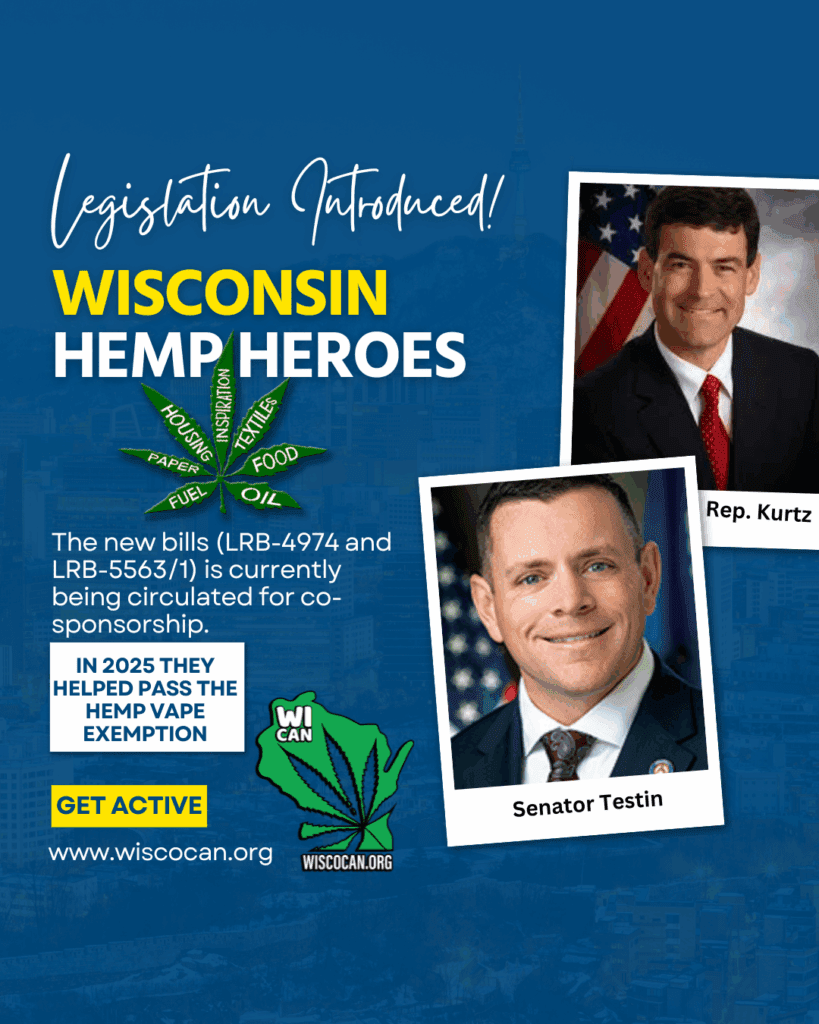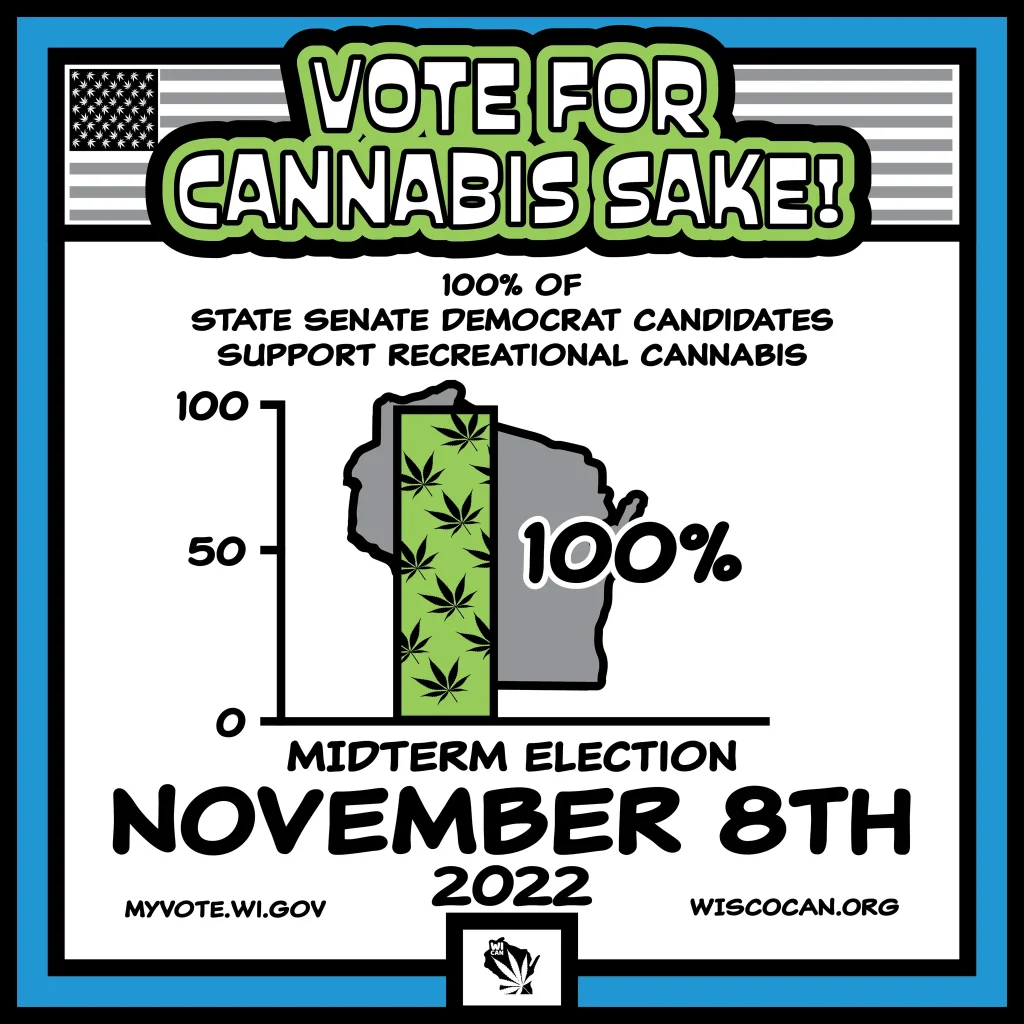Wisconsin’s Fourth Hemp Bill: A New Chapter in a Turbulent Legislative Session
Wisconsin’s hemp industry is heading into yet another round of legislative wrangling, as a fourth hemp bill is now being circulated for co-sponsorship in the Capitol. This time, the authors are Senators Patrick Testin and Tony Kurtz—two Republicans who once earned Hemp Hero Awards and were previously credited with helping secure the hemp vape exemption in the 2026–27 state budget. That exemption acted as a temporary shield, delaying a looming ban on hemp-derived vapes for one year—much like how “pork” inserted at the federal level both pushed harmful restrictions and bought the hemp industry precious time.
Now, Testin and Kurtz have returned with another proposal. The details are still emerging, but the political context is unmistakable: this is Bill #4 in what has become a chaotic, whiplash-inducing sequence of hemp legislation introduced in 2025–26.
Below is a brief timeline of how we got here.
A QUICK TIMELINE OF THE FOUR HEMP BILLS (2025–26 Session)
1. The First Bill — The Hemp Ban (Republican)
The session began with a disastrous proposal that attempted to criminalize hemp all over again, effectively banning intoxicating hemp products across the state.
This sweeping measure threatened farmers, processors, retailers, and consumers.
More here: “The Bill That Tried to Ban Hemp” on JaySelthofner.com.
2. The Second Bill — The Power Grab / Money Grab (Republican Alcohol Lobby)
Next came a bill driven largely by the Republican alcohol establishment, mirroring the federal push where alcohol interests helped manufacture a nationwide crackdown.
This proposal tried to fold hemp into the state’s three-tier alcohol system, handing control and profit windfalls to distributors and regulators who have nothing to do with Wisconsin’s hemp economy.
Coverage: “Oppose the Three-Tier System Regulation of Hemp.” Public Hearing Testimony
3. The Third Bill — The Messaging Bill (Democratic)
Democrats responded with Senate Bill 644, a messaging bill that attempted to frame a more reasonable regulatory structure and show public alignment with farmers, small businesses, and hemp consumers.
Though unlikely to pass under Republican control, it provided a meaningful counterpoint and reset the narrative.
Read more: “Democrats Introduce SB 644: A New Approach to Hemp Regulation.”
4. The Fourth Bill — The New Testin/Kurtz Proposal (Republican, Currently Circulating for Co-sponsorship)
Now arriving is the fourth installment, from Senators Testin and Kurtz.
This bill marks a notable moment—two lawmakers once celebrated by the hemp community are again stepping into the arena. Their past advocacy brought us the hemp vape ban exemption, delaying the worst impacts of budget-level restrictions.
Whether this new bill reflects a course correction, a compromise, or another attempt to centralize power remains to be seen. What is clear is that the hemp industry is facing another pivotal moment, and stakeholders must stay sharp, informed, and ready to act.
Conclusion
Four bills. Four very different strategies. One industry caught in the crossfire.
Wisconsin’s hemp community—farmers, processors, shop owners, patients, and consumers—cannot afford to sit back. The newest bill from Testin and Kurtz deserves close scrutiny, and as always, unified grassroots engagement will shape what comes next.

###
CO-SPONSORSHIP MEMORANDUM
To: All Legislators
From: Senator Patrick Testin
Representative Tony Kurtz
Date: Tuesday, November 18, 2025
Re: Co-sponsorship of LRB-4974 and LRB-5563/1 relating to: regulating hemp-derived cannabinoid products
DEADLINE: 5:00 PM on November 26th, 2025
In 2018, Congress passed the Farm Bill which redefined hemp, removed it from the Federal Controlled Substances Act, and created a regulatory structure within the USDA. The legislation also expanded the manner in which states and tribes may authorize and regulate hemp production. It transitioned hemp from a research-based product to an agricultural commodity under federal law. This, however, created an opening which allowed for the modification of hemp into intoxicating THC variants.
Despite its wide availability, the regulation of hemp-derived cannabinoid (HDC) products is essentially non-existent at the federal level, leaving a patchwork of different approaches taken by states across the country. In a national landscape where half of the states prohibit the purchase of cannabis, the market is being filled with what is now a multi-billion-dollar market for HDC products.
Currently in Wisconsin, HDCs are generally recognized as legal but are unregulated. There are no state laws that restrict the sale to minors, regulate potency or contents of HDCs, or establish labeling or packaging requirements. This bill creates certain stipulations and restrictions related to the sale of HDCs, such as:
- Age Restriction
- Truth-in-labeling
- Independent Testing Requirements
- Beverage Potency Limits
Regulations are needed to eliminate the current uncertainty regarding the status of these products, and to enact public safety protections.
If you are interested in co-sponsoring LRB-4974/LRB-5563, please respond to this email or call Sen. Testin’s office at 6-3123 or Rep. Kurtz’s office at 9141. All co-sponsors to the Senate Bill will be added to the Assembly version unless otherwise requested.
Analysis by the Legislative Reference Bureau
This bill creates certain requirements and restrictions related to the sale of hemp-derived cannabinoid products and modifies the definition of hemp. Current law defines “hemp” as “the plant Cannabis sativa L. and any part of that plant, including the seeds thereof and all derivatives, extracts, cannabinoids, isomers, acids, salts, and salts of isomers, whether growing or not, with a delta-9- tetrahydrocannabinol concentration of not more than 0.3 percent on a dry weight basis or the maximum concentration allowed under federal law up to 1 percent, whichever is greater, as tested using post-decarboxylation or other similarly reliable methods.”
Current law exempts hemp from the definitions of marijuana and tetrahydrocannabinol (THC), which are controlled substances and the possession, manufacture, or distribution of which is a criminal offense. The bill defines “hemp-derived cannabinoid” as any cannabinoid that is extracted from hemp, including delta-6-THC, delta-8-THC, delta-9-THC, and delta10-THC, subject to certain exclusions. A “hemp-derived cannabinoid product” is defined, subject to limited exceptions, as a product that contains or is labeled to contain a hemp-derived cannabinoid (HDC) and that is produced, marketed, or otherwise intended to be ingested orally, inhaled, or absorbed through the skin. The bill specifies that the definition of hemp includes an HDC product.
The bill also modifies the definition of hemp to specify that the qualifying criteria for hemp is tested using high-performance liquid chromatography, gas chromatography-mass spectrometry, or other similarly reliable methods.
The bill prohibits a person from selling, offering to sell, or otherwise providing an HDC product to a person who has not attained 21 years of age (underage person). The bill also prohibits an underage person from purchasing, attempting to purchase, or possessing an HDC product and from falsely representing his or her age for the purpose of obtaining an HDC product. The bill includes a defense for an HDC product seller if the purchaser appears to be of age and provides documentation supporting his or her false representation that he or she is of age.
Under the bill, before an HDC product may be sold or offered for sale to a consumer, the product manufacturer must submit a sample of each batch of the product to an independent, accredited laboratory for testing in accordance with generally accepted industry standards, and the laboratory must certify all of the following: 1) the product contains the amount of cannabinoids stated on the label, disclosed as a percentage and as milligrams per serving and, if applicable, per container; 2) the product does not contain more than trace amounts of mold, solvents, or certain other materials; and 3) the product is within the allowable delta-9-THC concentration for hemp. The certifying laboratory must provide the manufacturer with a certificate of analysis of testing results (COA) for the product. No person may sell, or offer to sell, to a consumer an HDC product unless the product is accompanied by the COA, which may be provided by means of a quick response (QR) code on the product’s label.
Under the bill, an HDC product may not be sold or offered for sale to a consumer unless the product is labeled with specified information, including 1) the name and contact information for the product’s manufacturer or brand owner; 2) the product’s serving size, servings per container, and cannabinoid profile per serving and in total for the container; 3) the product’s ingredients, including major food allergens; 4) the product’s potency, labeled as milligrams per serving, for total THC and for each HDC and the total amounts of THC and of each HDC in the product’s container; and 5) a warning statement containing specified information. An HDC product may not be sold or offered for sale to a consumer unless the product packaging is child-resistant and does not contain any feature likely to be appealing to children. An HDC product must be in a tamper-evident container or packaging or have a tamper-evident seal.
Under the bill, an HDC product that is produced or marketed as a beverage 1) may not contain more than 10 milligrams of THC in a single serving, and 2) if packaged in a nonresealable container, may not be sold in a container having more than two servings.
The bill specifies that a person may manufacture and sell for export from this state a hemp-extract product that is permitted to be manufactured, packaged, prepared, transported, or held for distribution in this state even if the hemp-extract product is not permitted to be sold to a consumer in this state.
The bill also specifies that a provision of current law, which requires a referral from the Department of Agriculture, Trade and Consumer Protection before a district attorney or the Department of Justice may prosecute a hemp-related violation, does not apply to enforcement of a violation of the bill’s provisions relating to HDC products.


